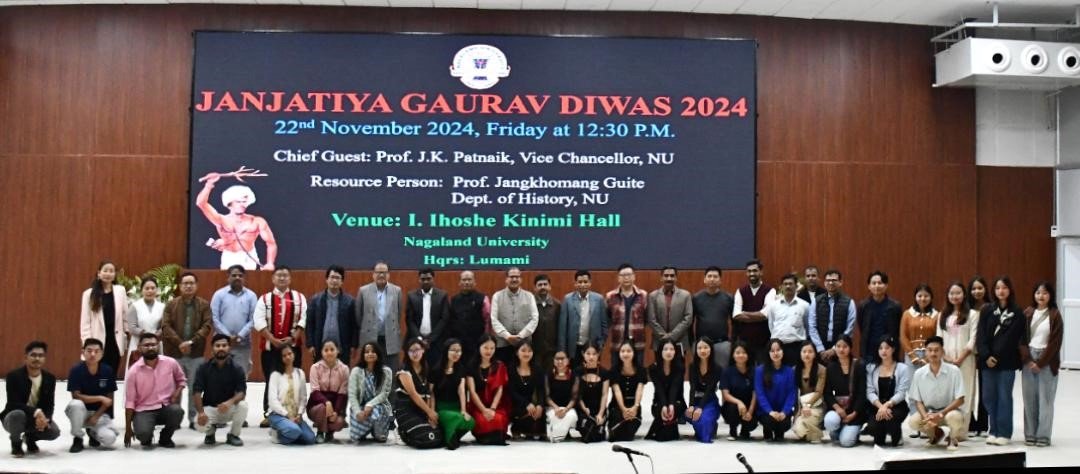Nagaland University organized a vibrant program on Janjatiya Gaurav Diwas on November 22, 2024, at the I. Ihoshe Kinimi Hall, Lumami. The event, celebrated under the theme of honouring tribal heritage and contributions, brought together scholars, students, and dignitaries in a bid to highlight the significance of tribal pride and identity, informed a press release by the NU PRO.
The program began with the Nagaland University Anthem. The event was chaired by Professor Athungo Ovung, Director of the Tribal Research Centre, who welcomed the gathering and shared insights on the intergenerational challenges of navigating between digital and traditional worlds in modern tribal societies. He also gave a brief overview of the significance of Janjatiya Gaurav Diwas.
Delivering the introductory remarks, Dr. Yamsani Srikanth, Assistant Professor at the Tribal Research Centre, highlighted the importance of elevating tribal communities in an elite-driven society. He commended the Government of India for initiating such events to ensure that tribal voices are represented and recognized. Dr. Srikanth emphasized the need to acknowledge unsung tribal heroes and their contributions while celebrating the custodianship of indigenous knowledge and environmental stewardship by tribal communities. “The inclusion of tribal perspectives brings unity to the diversity of the Indian state,” he stated.
The program featured a screening of a short documentary showcasing unsung tribal heroes from the Northeast region, shedding light on their forgotten contributions.
The event also included the prize distribution for an essay competition, presented by the Vice-Chancellor, Prof. Jagadish K. Patnaik. Addressing the audience, Prof. Patnaik underlined the importance of reconnecting with traditional roots, stating, “The identity of the tribal communities cannot be undermined. There are so many cultural markers linked to our practices that must be preserved.” He highlighted the rich diversity of Naga tribes and their unique traditions, emphasizing the need to safeguard these identities from external influences. Reflecting on the impact of colonialism, he noted how technological advancements had restructured society but underscored, “We should protect our culture and should not compromise our identity with anything.”
A folk song titled Lejole, performed by the postgraduate students, added a cultural touch to the event.
Download Nagaland Tribune app on Google Play

The keynote address, titled Cry of the Wilderness: Tribal Freedom Movements in Northeast India, was delivered by Prof. Jangkhomang Guite, Department of History, Nagaland University. Prof. Guite commended the Government of India for recognizing tribal contributions, noting, “This is not just a celebration but a recognition of our rights, voice, and identity.”
He challenged the misrepresentation of tribal narratives, asserting that Northeast tribes actively resisted colonial rulers. He highlighted significant events such as the Anglo-Khasi War (1829–33), Anglo-Garo War (1872–73), Anglo-Naga War (1875–80), Anglo-Mizo War (1890–95), Anglo-Kuki War (1917–19), and the Anglo-Zeliangrong Naga War (1930–33). Prof. Guite remarked, “Such collective resistance reflects solidarity and unity among the tribes.”
Delving into the essence of tribal pride, he advocated for deconstructing dominant narratives in external scholarship and embracing the notion of “ecological civilization,” which reflects the autonomy, liberty, and symbiotic relationship that tribal communities share with nature. “The cry of the wilderness should be heard through the voices of the tribal people in the region,” he concluded.
The program attended by statutory officers, heads, faculty, administrative staff, research scholars and PG students concluded with a vote of thanks delivered by Dr. Lobeno Mozhui, Assistant Professor, Department of Zoology. Janjatiya Gaurav Diwas at Nagaland University stood as a poignant reminder of the rich heritage, resilience, and invaluable contributions of tribal communities, urging the preservation and recognition of their identity and cultural pride. The programme was organised by a Committee comprising Dr. Yamsani Srikanth as Convener, Peter Ki as Secretary and other faculty members.

